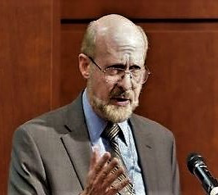Prosperity, Sustainability & Equity
Re-Writing Development Rules for Prosperity, Sustainability & Equity
Meet the Instructor:
Rick Rybeck, Esq., an attorney and real estate & urban development professional, was the former Deputy Administrator for Transportation Policy & Planning in the DC. He directs Just Economics, LLC, which helps communities harmonize economic incentives with public policy objectives for job creation, affordable housing, transportation efficiency and sustainable development.
Overview
More jobs and more affordable housing are top social goals. There is also a desire to remedy traffic congestion, environmental damage and the budget strain associated with wasteful and expensive infrastructure duplication associated with urban sprawl. This short course examines solutions to common economic incentives that inadvertently promote sprawl, economic decline (unemployment), inflated housing prices, and involuntary displacement (both gentrification and demolition by neglect).
Surprisingly, public infrastructure intended to facilitate development can motivate sprawl and decline. This “infrastructure conundrum” happens because well-designed and well-executed infrastructure inflates the price of well-served (prime) sites. High land prices chase development away to cheaper, but more remote sites (sprawl). Likewise, policies and programs intended to assist distressed communities can lead to higher land prices (rents) and the displacement of the intended beneficiaries.
In rust-belt cities, housing tends to be cheap by national standards. Yet, because of closed factories, many people in these cities are unemployed. For the unemployed, even a cheap house can be unaffordable. In Silicon Valley, the economy has been booming. Yet there, households earning six-figure incomes have difficulty finding decent affordable housing. It appears that we are on a “jobs-housing hamster wheel” where improvements in employment and income are offset by increases in housing prices.
Finally, because of the Covid-19 pandemic, local economies are suffering and government revenues are drying up. The need to generate economic recovery without additional spending (or additional revenue losses) is paramount to community wellbeing.
This course addresses the market forces responsible for the “infrastructure conundrum,” and the “jobs-housing hamster wheel”. Participants will learn innovative and effective policy solutions that can promote economic recovery without additional public spending or loss of revenue. Attendees will learn that HOW we collect public revenue is just as important as HOW MUCH revenue we collect.
- The Impact of Land Use on
- Energy and Resource Consumption
- Pollution
- Economic Productivity
- Affordable Housing
- Job Creation
- Fiscal Sustainability
- Fundamental Economic Principles That Explain Sprawl, Waste and Poverty
- User Fees
- Access Fees
- Examples of Harmonizing Economic Incentives with Public Policy Objectives To
- Reduce Sprawl & Traffic Congestion
- Enhance Job Creation
- Enhance Housing Affordability
- Promote Environmental and Economic Sustainability and Resilience
- Opportunities and Challenges for Implementation
- Legal Issues
- Administrative Issues
- Political Issues
- Understand economic rules that thwart efficiency and affordable access to infrastructure amenities
- Identify policies that can harmonize economic incentives with policy objectives for sustainability
Academics and Educators
- Re-grounding economic problems in overlooked fundamental economic principles
- Establish awareness of missing data (National Land Price Index)
- Identify user fees, access fees (including land value return & recycling) and zoning as techniques for integrating infrastructure and land use to enhance economic efficiency and productivity by internalizing externalities.
- Research opportunities to calibrate interactions between user fees, access fees and zoning.
Government Decision Makers
- Induce Economic Recovery without additional spending or loss of revenue
- Enhance job creation and housing affordability by internalizing externalities
- Understand Economic Rules that promote sprawl, inefficiency, pollution, and inequality -- HOW we raise revenues is just as important as HOW MUCH revenue we raise.
- Understand the differences between “taxes” and “fees.”
- Comprehend relationships between user fees, access fees and zoning.
- Learn successful examples of user fees and access fees (including land value return & recycling) as techniques for integrating infrastructure and land use to enhance economic prosperity, sustainability & equity.


